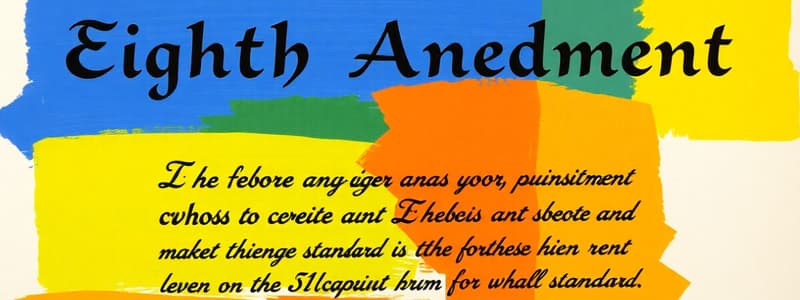Podcast
Questions and Answers
What does the Eighth Amendment prohibit?
What does the Eighth Amendment prohibit?
- Only cruel punishments
- Excessive bail, fines, and cruel punishments (correct)
- Excessive trials and legal fees
- Fines and imprisonment
According to the founders in 1789, which of the following was considered cruel and unusual punishment?
According to the founders in 1789, which of the following was considered cruel and unusual punishment?
- Death penalty for murder
- Cutting off hands (correct)
- Whippings of less than 40 lashings
- Piercing of the tongue with hot iron
In Trop v. Dulles, what did the court note about the definition of 'cruel and unusual punishment'?
In Trop v. Dulles, what did the court note about the definition of 'cruel and unusual punishment'?
- It should remain constant over time
- It only applies to torture
- It is based solely on historical practices
- It must change over time (correct)
What is the first principle outlined by Justice Brennan in determining 'cruel and unusual punishment'?
What is the first principle outlined by Justice Brennan in determining 'cruel and unusual punishment'?
What did the court conclude in Atkins v. Virginia regarding the execution of mentally retarded individuals?
What did the court conclude in Atkins v. Virginia regarding the execution of mentally retarded individuals?
What did Roper v. Simmons establish regarding executing minors?
What did Roper v. Simmons establish regarding executing minors?
Which punishment was NOT classified as cruel and unusual in the founders' view?
Which punishment was NOT classified as cruel and unusual in the founders' view?
What factor must be shown to justify the execution of mentally retarded individuals?
What factor must be shown to justify the execution of mentally retarded individuals?
Which of the following was considered acceptable punishment in the founders' view?
Which of the following was considered acceptable punishment in the founders' view?
Which principle does NOT help determine if a punishment is 'cruel and unusual'?
Which principle does NOT help determine if a punishment is 'cruel and unusual'?
What does the Court indicate about juvenile offenders compared to adults?
What does the Court indicate about juvenile offenders compared to adults?
According to the national consensus, how frequently are states applying capital punishment to juvenile offenders?
According to the national consensus, how frequently are states applying capital punishment to juvenile offenders?
How many countries, excluding the United States, have executed juvenile offenders?
How many countries, excluding the United States, have executed juvenile offenders?
What does the Eighth Amendment prohibit concerning juvenile offenders?
What does the Eighth Amendment prohibit concerning juvenile offenders?
Which statement best reflects the global perspective on life sentences for juveniles?
Which statement best reflects the global perspective on life sentences for juveniles?
Under what condition, based on Enmund v. Florida, may the death penalty NOT be imposed?
Under what condition, based on Enmund v. Florida, may the death penalty NOT be imposed?
What did Tison v. Arizona establish regarding the death penalty?
What did Tison v. Arizona establish regarding the death penalty?
What was noted about juvenile offenders and their culpability?
What was noted about juvenile offenders and their culpability?
Which behavior characterizes juvenile offenders in relation to their crimes?
Which behavior characterizes juvenile offenders in relation to their crimes?
What does the Eighth Amendment state about punishment?
What does the Eighth Amendment state about punishment?
How did the founders view whippings as punishment in 1789?
How did the founders view whippings as punishment in 1789?
What did the court note in Trop v. Dulles regarding punishment?
What did the court note in Trop v. Dulles regarding punishment?
Which principle did Justice Brennan emphasize in distinguishing 'cruel and unusual' punishments?
Which principle did Justice Brennan emphasize in distinguishing 'cruel and unusual' punishments?
What national consensus emerged from Atkins v. Virginia regarding capital punishment?
What national consensus emerged from Atkins v. Virginia regarding capital punishment?
Under what condition did Roper v. Simmons conclude executing minors is unacceptable?
Under what condition did Roper v. Simmons conclude executing minors is unacceptable?
What is a factor in determining a punishment's cruelty according to established principles?
What is a factor in determining a punishment's cruelty according to established principles?
In what way can societal changes affect the perception of punishments?
In what way can societal changes affect the perception of punishments?
Which of the following punishments was NOT considered cruel by the founders?
Which of the following punishments was NOT considered cruel by the founders?
What was one of the guiding principles in assessing punishments in Furman v. Georgia?
What was one of the guiding principles in assessing punishments in Furman v. Georgia?
What does the Eighth Amendment say about juvenile offenders convicted of non-homicidal crimes?
What does the Eighth Amendment say about juvenile offenders convicted of non-homicidal crimes?
What conclusion can be drawn regarding the global stance on juvenile life sentences for non-homicidal crimes?
What conclusion can be drawn regarding the global stance on juvenile life sentences for non-homicidal crimes?
In the context of juveniles, what contributes to the argument that they are generally less culpable than adults?
In the context of juveniles, what contributes to the argument that they are generally less culpable than adults?
What is stated about the application of capital punishment for juvenile offenders in the United States?
What is stated about the application of capital punishment for juvenile offenders in the United States?
What key finding did the Court reach in Graham v. Florida regarding juvenile sentences?
What key finding did the Court reach in Graham v. Florida regarding juvenile sentences?
What does Tison v. Arizona clarify regarding the imposition of the death penalty?
What does Tison v. Arizona clarify regarding the imposition of the death penalty?
What differentiates the death penalty eligibility based on the Enmund v. Florida ruling?
What differentiates the death penalty eligibility based on the Enmund v. Florida ruling?
What observation is made about the practice of executing juvenile offenders worldwide?
What observation is made about the practice of executing juvenile offenders worldwide?
In discussions about juvenile offenders, what aspect of their behavior is generally emphasized?
In discussions about juvenile offenders, what aspect of their behavior is generally emphasized?
Flashcards are hidden until you start studying
Study Notes
The Eighth Amendment
- The Eighth Amendment to the US Constitution prohibits excessive bail, excessive fines, and cruel and unusual punishments.
Founders' Understanding of “Cruel and Unusual Punishment”
- Acceptable punishments in 1789: Whippings (less than 40 lashes), piercing the tongue with hot iron, cutting off ears, public humiliation.
- Unacceptable punishments in 1789: Whippings of more than 40 lashes, cutting off hands, burning at the stake, death penalty for burglary or robbery, disembowelment.
Evolution of “Cruel and Unusual Punishment”
- The definition of “cruel and unusual punishment” must evolve alongside societal standards of decency.
- Practices considered acceptable in the past may be considered cruel in the future if societal views change.
Furman v. Georgia (1972)
- Four principles to determine if a punishment is cruel and unusual:
- Punishment must not degrade human dignity, particularly torture.
- Punishment inflicted in a wholly arbitrary (random or unpredictable) manner is considered cruel.
- Punishment that is completely rejected by society is cruel.
- Punishment that is demonstrably unnecessary is cruel.
Atkins v. Virginia (2002)
- Executing mentally retarded individuals is considered cruel and unusual punishment.
- The decision reflects the evolving standards of decency that mark the progress of society.
- A national consensus emerged against executing individuals with mental retardation.
Roper v Simmons (2005)
- Executing individuals who were under 18 at the time of the murder is considered cruel and unusual punishment.
- This decision acknowledges the developmental differences between juveniles and adults.
- The Court cited a growing national consensus against executing juveniles and looked to international practices, finding that only seven countries besides the US executed juvenile offenders.
Graham v Florida (2009)
- Sentencing juvenile offenders to life in prison without parole for non-homicidal crimes is considered cruel and unusual punishment.
- This type of sentencing for juveniles is widely rejected internationally.
- Juvenile offenders are generally less culpable than adults who commit similar crimes.
Death Penalty and Felony Murder
- The Eighth Amendment does not prohibit imposing the death penalty for felony murder.
- However, the death penalty may not be imposed on individuals who did not directly kill, attempt to kill, or intend to kill in the course of a felony (Enmund v. Florida, 1982).
- The death penalty may be imposed in certain felony murder cases if the individual was a major participant in the felony and acted with reckless indifference to human life (Tison v. Arizona, 1987).
The Eighth Amendment
- The Eighth Amendment of the U.S. Constitution prohibits excessive bail, excessive fines, and cruel and unusual punishments.
How the Founders Saw "Cruel and Unusual Punishment” in 1789
- Whippings of less than 40 lashings, piercing of the tongue with hot iron, cutting off ears, death penalty for murder or rape, and public humiliation were not considered cruel and unusual.
- Whippings of more than 40 lashings, cutting off hands, burning at the stake, death penalty for burglary or robbery, and disembowelment were considered cruel and unusual punishment.
Trop v Dulles (1959)
- The meaning of "cruel and unusual punishment" shifts with the "evolving standards of decency" of society.
- Practices deemed acceptable in the past may be considered cruel in the present if societal standards have evolved.
Furman v. Georgia (1972)
- A punishment is cruel and unusual if it is:
- Degrading to human dignity, especially torture.
- Arbitrarily inflicted.
- Rejected by society.
- Unnecessary.
Atkins v Virginia (2002)
- It is cruel and unusual punishment to execute someone who is intellectually disabled.
- Executing intellectually disabled individuals doesn't serve the goals of retribution or deterrence, and is unnecessary.
Roper v Simmons (2005)
- It is cruel and unusual punishment to execute someone who was under 18 at the time of the crime.
- Juveniles have a lack of maturity, responsibility, and impulse control.
Graham v Florida (2009)
- It is prohibited to sentence a juvenile offender to life in prison without the possibility of parole for non-homicidal crimes.
Death Penalty and Felony Murder
- The Eighth Amendment does not bar the death penalty for felony murder.
- A person who did not kill, attempt to kill, or intend to kill during a felony cannot be sentenced to death.
- Someone who was a major participant in the underlying felony and acted with reckless indifference to human life can receive the death penalty.
Studying That Suits You
Use AI to generate personalized quizzes and flashcards to suit your learning preferences.


